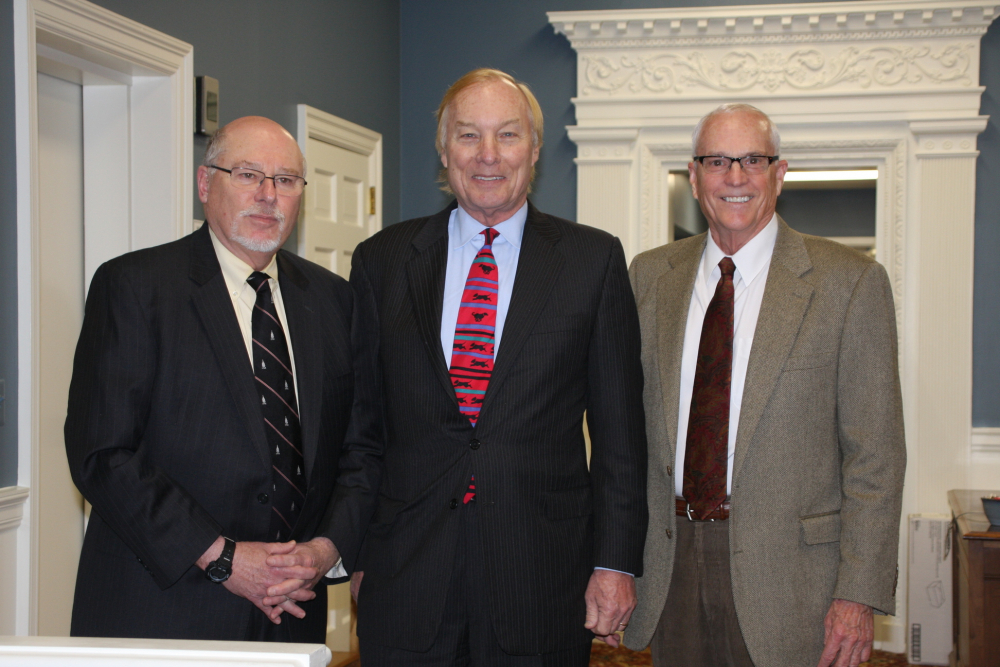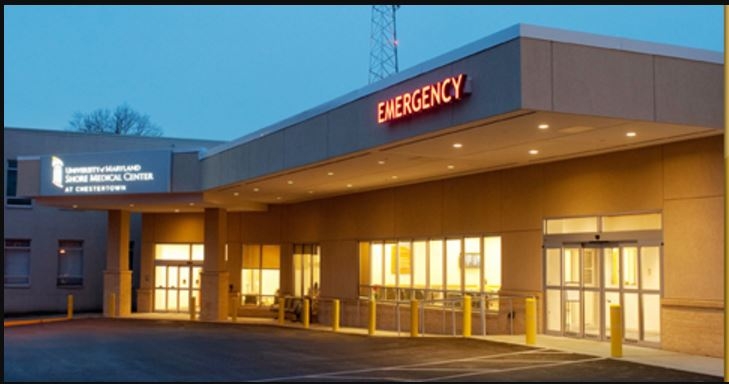
Washington College President Kurt Landgraf, Comptroller Peter Franchot, and Dixon Valve CEO Dick Goodall pose for a photo before a meeting in Landgraf’s office to discuss the future of the Chestertown Hospital. Photo by Jane Jewell
Peter Franchot, the Comptroller of Maryland, met with a small group of residents concerned about the future of the Chestertown hospital on Friday, Feb. 1. The meeting, originally scheduled for a downtown restaurant, was moved to the office of Washington College President Kurt Landgraf and was not open to the public or the press. Another meeting scheduled for Jan. 31, which would have been open to the public, was canceled because there was no heat in Town Hall, the site scheduled for the meeting.
However, Dr. Gerald O’Connor, who has been one of the prime forces in the Save the Hospital group, provided a press release summarizing the meeting. He wrote:
“The leadership of ‘Save the Hospital’ succeeded, on Friday, to raise awareness of our community’s concerns about our hospital to the highest levels in Annapolis by meeting with Comptroller Peter Franchot. We talked about the services the hospital provides today, as well as our concern that the hospital may not be able to continue providing inpatient care beyond 2022. That’s when the Emergency Room and other outpatient services will continue, but inpatient beds will likely be closed.
“Our meeting in the offices of Kurt Landgraf, the President of Washington College, was extremely candid. Three doctors explained their concerns that the hospital no longer has the number of nursing and tech staff it should have to care for the number of patients who normally need inpatient care throughout the year, and they expressed concerns that retired physicians and specialists have not always been replaced.
“We spent a good deal of time talking about the enormous impact that the hospital has on the area’s economy. President Landgraf as well as Dixon Valve CEO Richard Goodall and Heron Point Executive Director Garret Falcone led that discussion, as did Kent County Commissioner Bob Jacob, Chestertown Councilman Marty Stetson and Main Street Historic Chestertown Manager Kay MacIntosh.
“Comptroller Franchot listened closely and asked good questions, and his Chief of Staff, Len Foxwell—who, incidentally, was born in the hospital in Cambridge—took notes. Mr. Franchot has long been a friend of the Eastern Shore, especially Kent County and Chestertown. Remember? He saved us when the Highway Department said it was going to close the Chester River Bridge for almost a month. We understand that he can’t make specific promises about what he’ll do, but we trust that he is as good as his word. He said he would ‘act as a cheerleader’ and invited us to call on him again and again when there are opportunities when he might be helpful.
“Meanwhile, we want our community to remain loyal to the hospital in all ways—use the hospital when you need care, donate to the Hospital Foundation so equipment will always be state-of-the-art, thank Comptroller Franchot for his support, and tell Governor Hogan we need his help.”

UM Shore Medical Center – Chestertown
Franchot took a few minutes before the meeting to talk to reporters who had initially been told they would be welcome at the meeting. He said he came to the meeting to listen to residents. “I’m very sympathetic,” he said, noting that what’s happening with the Chestertown hospital is an example of what’s happening to hospitals nationwide. He gave the example of a hospital in Montgomery County, with 400 beds, only 10 of which he said were currently occupied. “Everybody’s going through a transition” in healthcare, he said. The issue is how to get from very good, but expensive, healthcare to upgraded healthcare for people in a wider region at a more affordable rate. “We need a new group of people trained in healthcare, and we need urgent care access,” he said. He expressed hope that the meeting would be “a stepping stone to something more accessible.”
Landgraf, in a phone conversation Feb. 4, said that Franchot and his staff spent most of the time listening. Everyone had a chance to make comments for a few minutes. He said that Franchot “really listened and understood the issues”. Franchot’s response to the presentation was that the Save the Hospital group would need to discuss the situation with the University of Maryland Hospital system, the parent group for Shore Regional Health. The group should come to the meeting prepared to offer solutions, Franchot said. Also, he said, the Save the Hospital group needs to present its case to state Senator Steve Hershey and to Governor Larry Hogan. However, Franchot said, there isn’t much he can do in his role as Comptroller, although he said the implications of the hospital for economic development were very critical. He stressed that the local group needs to have a plan moving forward and deliver a set of recommendations to the University of Maryland. The most important point to come out of the meeting, Landgraf said, is that emotionalism and criticism of the hospital aren’t getting us anywhere. Landgraf said the group needs to think about how the hospital can become “a center of excellence,” offering high-quality services not offered elsewhere in the system so people will come here rather than going elsewhere for care.
Those present at the meeting with Comptroller Franchot were from various stakeholders including several doctors, local government officials, along with representatives from Washington College, Dixon Valve, Save Our Hospital, and other concerned citizens. More meetings are expected to take place in the future, and the Chestertown Spy will be there to report.



Bill Anderson says
Come on, folks — this reduction in hospitals, doctors and care is a part of the “Affordable Care Act”; the “end of life” portion of it. Too many people thought that referred to discussions and decision making about the end of life protocols to ease one from this life to eternal life. Too few grasped the implementation process of closing or degrading hospital care to place it far enough away from homes that many could be expected to expire during the trip.
David Sheets says
How the above author could come to the conclusion as he does of the intent of the Affordable Care Act (plan that President Obama and staff created) is at best Trump mentality thinking and the end of life so acknowledged was simply and completely related to one’s decision to prepare for her or his days when their cognitive abilities or ability to rationally make decision regarding their health care desires need to be addressed when one is cognitively capable of so making the Living Will decisions in advance of a state of medical need may lead to all efforts to keeping one alive is adhered to …as this writer has discussed in past years with patients and families.
Both me and the writer are retired and depend upon the U. of MD’s Medical Center at Chestertown for such outpatient services as needed as well as two surgeries that I had there in late 2017; I am a 100% permanently and totally disabled Veteran wounded severely in my first tour in Vietnam in 67 – we are retired and elected to make our new home here in Chestertown largely based on the medical care available for preventable care as well as the Hospital having been kept open and specifically updated by the U. of MD medical system at the Chestertown Hospital – which is a blessing for us and the community.The larger problem may be of those not electing to receive any medical care here due to their insurer not having the hospital system under their list of providers.